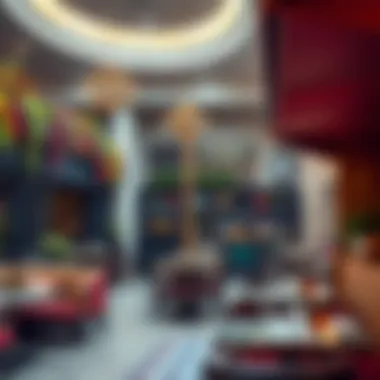Discovering Turkish Flavors in Dubai's Dining Scene


Intro
Turkish cuisine presents a rich tapestry of flavors and traditions, and it finds a vibrant expression amidst the myriad dining options in Dubai. This city is a melting pot of cultures, and Turkish gastronomy fits seamlessly into this colorful mosaic. As one meanders through the streets of Dubai, they will encounter whispers of sizzling kebabs, sweet notes of baklava, and the intoxicating aroma of spices that call out to food enthusiasts. This guide is crafted to unravel the intricate layers of Turkish food culture available in Dubai, shedding light on its unique dishes, cultural influences, and memorable dining experiences that enthrall both residents and visitors.
Market Insights
The culinary landscape of Dubai thrives with an assortment of dining choices, and Turkish restaurants have carved out a notable niche.
Current Trends
At present, Turkish cuisine not only retains its authenticity but also embraces modern adaptations that appeal to local and expatriate residents. The popularity of dishes like döner kebabs and pide has surged, leading to a notable increase in Turkish establishments from casual eateries to upscale venues. These eateries often attempt to marry traditional techniques with contemporary dining concepts – think open kitchens or artisanal bread baked fresh each day.
The trend towards health-conscious eating has also seen lighter versions of classic dishes making the rounds, catering to a clientele eager for flavor without guilt.
Investment Opportunities
Investors looking at Dubai’s dining scene might find significant prospects in Turkish cuisine. As awareness grows, more catering to gourmet dining experiences opens up a rich field for investment. With the rise of food festivals and gastronomic events, those aligned with Turkish culinary heritage can leverage this excitement to attract dining enthusiasts. Establishments that provide immersive cultural experiences—from traditional music to storytelling dinners—are increasingly in demand, providing lucrative opportunities for entrepreneurs.
"Investing in culinary experiences offers both financial benefits and cultural enrichment. It’s a sweet deal in a city like Dubai, where flavors from every corner of the globe are celebrated."
Dining Experiences
The charm of Turkish food in Dubai isn’t limited to the dishes themselves. The dining atmosphere plays a pivotal role in how the cuisine is perceived. Traditional Turkish tea houses and meyhanes (taverns) encapsulate an inviting ambiance that encourages sharing and sociability. The layout of these spaces often reflects an old-world charm, with intricate tile work and Turkish lamps creating a warm, inviting environment.
Additionally, many establishments have started offering unique culinary classes and tasting menus, providing hands-on approaches to explore the depth of Turkish gastronomy. Such experiences allow guests to dive deeper not just into the food but also the cultural significance that these dishes hold.
Prominent Dishes
While many Turkish dishes are familiar to global palettes, in Dubai, they take on a unique twist influenced by local ingredients and customs. Here are a few key offerings:
- Kebabs: The traditional ones, from Shish to Adana, feature rich marinades and are often cooked over natural wood fires, enriching the flavors.
- Meze: A delightful collection of small plates, meze showcases everything from hummus to stuffed grape leaves, perfect for sharing.
- Baklava: This sweet treat, layered heavenly with nuts and honey, serves not just as dessert but as a centerpiece in celebrations.
Epilogue
As Turkish cuisine continues to gain traction in Dubai, it not only nourishes the body but fosters connections among diverse communities. From street-side eateries to high-end restaurants, the flavors of Turkey resonate across the dining spectrum, making it an essential part of Dubai’s culinary heritage. This guide aims to provide a closer look at what makes Turkish gastronomy special in this bustling metropolis.
Prelims to Turkish Cuisine
Turkish cuisine embodies a fascinating mix of flavors, history, and cultural narratives that reflect the diverse tapestry of its origins. With influences spanning the Mediterranean, the Middle East, and Central Asia, it brings together aspects from various traditions while also highlighting local tastes and ingredients. Understanding Turkish cuisine in Dubai not only enriches one’s gastronomic knowledge but also deepens appreciation for the cultural intersections present in the city’s vibrant food scene.
Essentially, the significance of Turkish cuisine in Dubai cannot be understated. It offers a portal into a world where culinary traditions meet modern dining practices, revealing how the two coexist beautifully. The meticulous preparation of dishes like kebabs and mezzes, alongside the delicate artistry seen in baklava, showcases the dedication to taste and presentation that is at the heart of this cuisine.
This section serves as a foundation for exploring the multifaceted nature of Turkish cuisine. The upcoming segments will unravel the distinct character of the dishes, the evolution of restaurants in Dubai, and the cultural significance intertwined with dining experiences. Essentially, this exploration is not just about food; it's about connecting people and cultures through shared meals.
Defining Turkish Cuisine
Turkish cuisine is a celebration of rich flavors, vibrant colors, and aromatic spices. It's an umbrella term that encompasses a variety of regional specialties stemming from the diverse landscapes and climates in Turkey. Central to the cuisine are staples like bread, vegetables, meat, and dairy products, often skillfully combined in ways that burst with flavor.
One defining characteristic of Turkish cuisine is its emphasis on freshness. Ingredients are usually acquired from local markets, giving dishes an authentic taste. Consider the classic meze platter, which typically consists of a variety of appetizers such as hummus, stuffed grape leaves, and yogurt dips. Each item tells a story, bridging the age-old recipes passed down through generations.
Additionally, the culinary methods often involve techniques like grilling, baking, or slow-cooking that enhance the natural flavors of the ingredients. This approach not only maintains the integrity of the food but also allows for unique interpretations and adaptations that reflect both tradition and innovation.
Cultural Significance
The cultural significance of Turkish cuisine transcends merely sustenance; it plays a vital role in social interactions and customs. Food in Turkey is a medium for hospitality, unity, and celebration. In gatherings—be it family meals or festive celebrations—sharing food embodies a sense of togetherness and community.
Furthermore, Turkish cuisine has connections to historical migratory patterns and trade routes, which have acted as conduits for exchanging not just ingredients but also culinary techniques. The resulting food culture reflects a blend of Ottoman, Persian, and Arab influences, creating a unique yet familiar environment in which dishes resonate with diverse communities.
Eating is also intertwined with cultural rituals. For example, traditional teas and coffee are central to many gatherings, serving as an invitation to converse and connect. Such customs are preserved through modern adaptations, showcasing the cuisine's resilience and its ability to evolve while maintaining its heritage.
"Food is the thread that stitches the fabric of culture together, showing us where we've come from and where we are going."
In Dubai, the blending of those elements takes on a new dimension, catering not just to the expatriate population but also establishing a dialogue with locals, creating an enriched culinary landscape. In this context, Turkish cuisine doesn't just fill the stomach; it nourishes the soul.


The Evolution of Turkish Restaurants in Dubai
The evolution of Turkish restaurants in Dubai presents a fascinating case study of cultural amalgamation and culinary adaptation. As Turkish cuisine finds its footing in Dubai’s diverse dining ambiance, understanding this evolution is crucial. It highlights not just the adaptability of Turkish culinary traditions but also the increasing enthusiasm from both residents and visitors toward authentic Turkish flavors.
Historical Context
To truly grasp how Turkish restaurants have blossomed in Dubai, we need to take a step back and look at the historical backdrop. The UAE has a long-standing relationship with Turkey, deeply rooted in trade and cultural exchanges. The Turkish presence in this region can be traced back centuries, when merchants exchanged goods and culinary secrets. Fast-forward to the 21st century; the influx of expatriates, coupled with tourism growth, has acted as a catalyst for Turkish restaurants to flourish.
In the early days, the Turkish culinary scene in Dubai was sparse and primarily comprised small eateries serving basic fare. Bakeries selling simit and other traditional breads could be found relatively easily, but options were limited. As interest burgeoned, particularly in the late 1990s, more prominent establishments began to emerge, bringing with them a wider variety of dishes and a more sophisticated dining experience.
This growth also coincided with the UAE's rise as a global destination for food enthusiasts. The Dubai Food Festival and other culinary fairs played an essential role in showcasing the richness of Turkish cuisine. Through culinary demonstrations and workshops, chefs highlighted how the elements of Turkish gastronomy could seamlessly integrate with the preferences of Dubai's multicultural population.
Growth Trends
Today, Turkish restaurants can be spotted on just about every corner of Dubai, reflecting a significant trend. This surge can be attributed to several factors that have resonated with the local food culture:
- Diverse Offerings: From traditional kebabs to sophisticated meze platters, the breadth of options attracts food lovers from all walks of life. Each dish tells a story, allowing diners to experience the cultural depth behind the flavors.
- Social Media Influence: In a city where social media reigns, visually appealing dishes from Turkish restaurants have caught the attention of the public. Pictures of ornate baklava and sizzling kebabs flood platforms like Instagram, further enticing potential diners.
- Adaptation to Local Tastes: Many Turkish restaurants have taken the initiative to cater to local preferences without losing their essence. This includes incorporating local spices or offering halal options, fostering an environment that respects both cultures.
- Culinary Innovation: Innovative Turkish chefs in Dubai are infusing traditional recipes with a contemporary twist. For instance, using local seafood in classic Turkish dishes not only boosts sustainability but also creates a unique blend that appeals to the local palate.
The evolution of Turkish restaurants in Dubai represents a melding of traditions, creating a culinary landscape that honors the past while embracing the future.
As we navigate this vibrant dining scene, the evolution of Turkish cuisine is more than just about food; it reflects Dubai's identity as a melting pot of cultures where flavors and stories intertwine.
Key Turkish Dishes to Discover
In the bustling city of Dubai, the culinary scene is as diverse as its residents, and Turkish cuisine stands tall among the various offerings. Not only is it rich in flavors, but it also holds a special place in the heart of food lovers. Delving into the key Turkish dishes is vital because they provide a window into the cultural tapestry of Turkey, enriched by its history and geographical influences. These dishes serve as a bridge connecting some distant heritage with a modern-day, cosmopolitan environment like Dubai. Moreover, they showcase the art of cooking that is so intrinsic to the Turkish way of life.
Turkish cuisine emphasizes social dining experiences and often features dishes designed for sharing, which align perfectly with the communal lifestyles found in Dubai. Understanding these key dishes is also essential for anyone looking to engage meaningfully with the local dining culture.
Mezze: The Art of Sharing
When it comes to Turkish dining, mezze plays a star role. This array of small dishes is meant to be shared, offering a social experience that transforms a meal into a celebration. Traditional mezze often includes hummus, dolma (stuffed grape leaves), and a variety of pickled vegetables. Each dish boasts its distinct flavor, making the dining experience more vibrant.
Sharing mezze promotes communication and connection among diners, embodying the Turkish spirit of hospitality. Orders can range from light bites to more elaborate presentations, allowing guests to taste a bit of everything. For instance, a platter of kishk (yogurt dish) alongside eggplant salad can spark delightful conversations over the layers of flavors and textures.
"Mezze is more than food; it’s an experience that fuses flavor with social connection."
Kebabs: A Grilled Delight
Kebabs are perhaps one of the most recognizable aspects of Turkish cuisine. From adana kebab to döner kebab, the methods of preparation vary widely, yet they all promise a burst of flavor. The art of grilling meat is perfected in Turkey, where marination techniques elevate simple ingredients to gourmet experiences.
In Dubai, you can find traditional skewered kebabs served alongside warm pita and fresh salads. Each bite of a well-cooked kebab is a harmonic blend of spices, heat, and juicy tenderness that lingers on the palate. The creativity in Turkish kebabs doesn’t stop with meat; many variations incorporate vegetables or alternative proteins, catering to the diverse dietary preferences found in the city. Visitors are sometimes surprised to find out that kebabs can be incredibly versatile, transcending mere street food to gourmet dishes heralded by seasoned chefs.
Baklava: A Sweet Tradition
No exploration of Turkish cuisine would be complete without mentioning baklava. This dessert is a sweet symphony of phyllo pastry, nuts, and honey, presenting a rich tasting experience that has delighted diners for centuries. It's not just a dish; it's a legacy tied deeply to Turkish culture and history, varying greatly from region to region.
In Dubai, you may encounter different interpretations of baklava, with local bakeries often infusing inventive flavors, such as pistachio or rose water. Each bite offers a sweet and buttery crunch that perfectly balances the flavor richness inherent in the nuts. Baklava exemplifies the attention to detail found in Turkish cooking, where every layer of pastry and nut is crafted with care. It's served during special occasions and celebrations, symbolizing joy and togetherness.
Closure
In essence, the key Turkish dishes of mezze, kebabs, and baklava exemplify the heart of Turkish gastronomy. They do not simply satisfy hunger; they create connections and foster a sense of community. For anyone navigating Dubai's culinary landscape, these dishes not only offer delicious sustenance, but also provide a deeper cultural appreciation of Turkey—fostering an understanding of the shared human experience behind every meal.
Popular Turkish Restaurants in Dubai
The excitement of exploring a foreign cuisine often peaks at the very establishments where these culinary wonders come to life. Turkish restaurants in Dubai encapsulate the essence of Turkish gastronomy, providing a vivid insight into its culture, flavors, and social dynamics. These eateries do more than just serve food; they are places where stories unfold, memories are forged, and palates are indulged, presenting an oasis for both Turkish expatriates and locals craving a unique dining experience.
Overview of Notable Establishments
Dubai boasts a plethora of restaurants celebrating Turkish cuisine, making it difficult to narrow down the standout spots. However, some establishments have etched their names in the culinary world due to their exceptional offerings and dedication to authenticity.
- Zahidi Restaurant: Nestled in the heart of Dubai, Zahidi has mastered the art of presenting classic Turkish dishes with a modern twist. Their lamb döner is often praised, with flavors that evoke the warmth of traditional Turkish kitchens.
- Saray Muhallebicisi: This establishment offers a nostalgic dining experience, reminiscent of the cozy corner joints in Istanbul. Their menu shines with a variety of meze and the ever-popular baklava, crafted from an age-old family recipe.
- Taksim Restaurant & Lounge: With its vibrant ambiance and live music, Taksim offers a dining experience that celebrates not just the food but also the culture itself. Their mixed grill platter is a favorite, often considered a feast for both the eyes and the stomach.
These restaurants not only serve as a dining option but also as cultural hubs where residents can gather and engage, turning meals into connections.
Ambiance and Service


When dining out, the ambiance and service can significantly enhance the overall experience. Turkish restaurants in Dubai often create environments that mirror the hospitality typical of Turkey itself.
- Welcoming Vibes: Most establishments, like Haveli and Kebapçı İskender, exude a homey warmth. Decorated with Turkish rugs, vibrant tiles, and traditional accents, they transport diners to the streets of Istanbul. It’s like stepping into a vibrant marketplace, filled with warm colors and inviting aromas.
- Impeccable Service: Attention to detail is not overlooked. Staff members are usually knowledgeable about the menu, happy to recommend dishes, and always willing to cater to dietary restrictions. The hospitality is evident: diners are often welcomed with a friendly smile, which adds a personal touch to the experience.
These aspects guarantee that the experiences at these Turkish establishments are both memorable and delightful, fostering a space where guests feel both appreciated and connected to a tradition far removed from their everyday lives.
Overall, popular Turkish restaurants in Dubai serve as more than just meal providers. They establish genuine community connections while showcasing the vibrant cultural tapestry that Turkish cuisine brings to the city.
Dining Experience: What to Expect
Dining out at a Turkish restaurant in Dubai is an experience that extends far beyond simply enjoying a meal. It brings a blend of culture, tradition, and community engagement, all rooted in the culinary richness of Turkey. For residents and expatriates interested in diverse gastronomy or looking for authentic experiences, understanding what to expect during a Turkish dining experience is essential. It encompasses everything from the visual delight of the dishes to the etiquette that surrounds the table, ensuring that every meal is both flavorful and meaningful.
Culinary Presentation
When one steps into a Turkish restaurant, the first element that captures attention is often the spectacular presentation of food. Imagine vibrant platters overflowing with colorful salads, steaming skewers of grilled kebabs, and golden, flaky baclava artfully arranged. The aesthetics in Turkish cuisine isn’t only about beauty; it's about inviting diners to feast with their eyes. Plating is an art form, and Turkish chefs take pride in every layer and detail.
For instance, dishes like Mezze are served in a way that encourages sharing - small bowls filled with hummus, tzatziki, and muhammara, perfectly arranged to invite guests to sample a bit of everything. This visually appealing presentation also encourages social interaction, making each meal a communal affair. The use of fresh herbs and spices not only infuses diverse aromas into the dining space but also makes each dish a feast for the senses.
Dining is not just about the food itself; it’s about the emotions and stories it conveys. As such, the presentation sets the stage for a unique culinary experience that resonates long after the meal is over.
Cultural Customs in Dining
Dining customs in Turkish culture emphasize warmth, hospitality, and a sense of belonging. Before even taking a bite, diners can expect warm greetings from restaurant staff, who often strive to create an inviting atmosphere that instantly enhances the experience.
A few key customs include:
- Sharing is Caring: Meals are often served family-style, with plates placed in the center for everyone to enjoy. This fosters conversation and togetherness.
- Bread is Sacred: In Turkey, bread holds immense importance. Often, a basket of fresh, warm bread is provided at the beginning of the meal. Sharing bread is also a sign of hospitality.
- Sipping Tea or Coffee: After a meal, it’s customary to sip on tea or Turkish coffee. Offering a cup reflects friendship and bonding, allowing for discussions to flow long after the last bite.
- Respecting Elders: When dining in a family setting or traditional gathering, there’s a notable respect for elders in offering the best pieces first. Each custom is steeped in respect and practiced with pride.
In summary, the dining experience in a Turkish restaurant in Dubai is a vivid tapestry of sensory pleasures, tied together by rich traditions and customs. It gives locals and visitors alike a glimpse into the warm and welcoming heart of Turkish culture. With its artful presentations and profound customs, every meal served is a celebration of togetherness and flavor, making it memorable for all.
Eating together is a way to stay connected. In Turkish culture, it emphasizes not just nourishment, but the joy of sharing moments and creating memories.
Turkish Cuisine’s Appeal to Dubai’s Residents
Turkish cuisine holds a unique place in the hearts and palates of Dubai’s diverse population. This appeal stems from several factors, including the rich tapestry of flavors, cultural connections, and the harmonious blend with local ingredients. Here, we explore profound elements contributing to this popularity and the overall significance of Turkish food in Dubai’s culinary landscape.
Flavor Profiles
Turkish cuisine is like a painting, blending various flavors into a pleasing visual and gustatory experience. It appeals to both the adventurous eater and those with more traditional tastes. One might notice the subtle warmth of spices, such as cumin and paprika, alongside the refreshing touch of herbs, like parsley and mint. The use of yogurt plays a central role, often accompanying dishes to balance the richer flavors found in grilled meats and stews.
A striking example is the harmonious flavor of kebabs, which come with myriad marinades and seasonings, bringing out the natural flavors of the meat while offering a delightful char from the grill. These dishes often get paired with pide, a Turkish bread, creating a symphony of textures, where crispness meets tenderness. Moreover, the use of fresh vegetables, whether in salads or as accompaniments, contributes to the refreshing aspect of meals, making them light yet satisfying.
"In Dubai, each meal is a celebration; the variety in Turkish cuisine caters to everyone from meat lovers to those seeking vibrant vegetarian options."
Fusion with Local Ingredients
Dubai, being a fusion hub, has naturally influenced how Turkish cuisine manifests in the region. Many local restaurants have embraced this influence, incorporating local ingredients into traditional recipes. For instance, you'll find zaatar and sumac, spices commonly used in Middle Eastern cooking, appearing in Turkish dishes. This infusion of local flavors provides a fresh twist on familiar recipes and enhances the culinary appeal.
Additionally, seafood options are being creatively integrated into classic Turkish fare. Imagine a seafood döner, which replaces traditional meat with freshly caught fish, adding a local touch to a beloved dish. Furthermore, local vegetables are utilized in mezze platters, showcasing regional produce while staying true to the spirit of sharing and community inherent in Turkish dining.
As Dubai continues to grow and evolve, the adaptation and merging of flavors allow Turkish cuisine to remain relevant and appealing, ensuring it weaves more deeply into the city’s gastronomic fabric.
For further reading on culinary fusions, visit Wikipedia or Britannica.
The Role of Food Festivals in Promoting Turkish Cuisine
Food festivals play a pivotal role in showcasing Turkish cuisine, highlighting not just the dishes themselves but also the cultural richness that envelopes them. In a cosmopolitan city like Dubai, which thrives on diversity, these events serve as a bridge between traditions and palates, enabling a wider audience to engage with and appreciate Turkish culinary arts. The interaction between food and culture at these festivals helps instill a sense of connection among locals and expatriates, transforming meals into shared experiences.
Festivals elevate Turkish cuisine from a mere dining option to an immersive cultural journey, allowing attendees to taste and participate in celebrations rooted in centuries of tradition. The benefits are manifold; ranging from strengthening community bonds to fostering appreciation for culinary craftsmanship, these events offer a platform for culinary creativity.
Culinary Events and Celebrations
Culinary events form the heartbeat of Turkish food festivals. These gatherings often feature prominent chefs who demonstrate the preparation of classic dishes. Imagine a bustling courtyard where the air is filled with the tantalizing aroma of kebabs, baklava, and fragrant spices, creating an atmosphere alive with the spirit of celebration. Residents and visitors alike gather to watch, learn, and taste, making it a communal experience that fosters social interaction.
Additionally, many festivals host competitions where local chefs showcase their skills by creating unique interpretations of traditional recipes. This not only highlights the versatility of Turkish cuisine but also encourages innovation while maintaining the essence of classic dishes. The chance to win awards or recognition drives culinary minds to push boundaries, attracting wider audiences.


"Food is not just about nourishment; it’s about bringing people together."
This quote encapsulates the very nature of culinary events at food festivals. The fusion of vibrant flavors and communal dining acts as a catalyst for deeper cultural understanding.
Cultural Exchange Opportunities
Food festivals in Dubai serve as a dynamic platform for cultural exchange between Turkish residents and the diverse populace of the city. Here, fledgling conversations spark as attendees share stories, recipes, and traditions informed by their backgrounds. Each bite of pide or sip of turkish tea opens doors for dialogue that transcends culinary boundaries.
Moreover, many festivals include workshops and seminars discussing the historical context and cultural significance of Turkish dishes. These segments offer insights into the intricate relationships between food and traditions, allowing people to peek behind the curtain of the culinary arts.
Participating in these opportunities often leads to collaborations between chefs and culinary enthusiasts from different backgrounds. Such partnerships not only blend flavors but also foster relationships that can endure long after the festival has closed its doors.
In summary, the promotion of Turkish cuisine through food festivals in Dubai goes beyond merely serving good food; it’s about nurturing connections, celebrating diversity, and sharing a culture that resonates on many levels. Through culinary events and cultural exchanges, the authentic tastes of Turkey find a vibrant home within the melting pot of Dubai.
Challenges Faced by Turkish Restaurants
When it comes to Turkish cuisine in Dubai, the challenges faced by restaurants are significant. From intense competition to the need for adaptation to local tastes, these hurdles can affect everything from menu development to customer satisfaction. Understanding these challenges is crucial for anyone interested in the culinary landscape of Dubai. Addressing these issues not only helps restaurants thrive but also contributes to the overall richness and diversity of food culture in the city.
Competition in Dubai’s Dining Scene
The first major challenge is the sheer competition in Dubai’s dining scene. Dubai is renowned for its diverse food offerings, epitomizing a melting pot of flavors and cuisines. This vibrant backdrop creates a tough arena for Turkish restaurants aiming to carve out their niche. With various food options ranging from local Emirati dishes to international cuisine, Turkish establishments must stand out.
- Branding and Marketing: Effective marketing strategies are essential. Restaurants that leverage social media platforms, engage with food bloggers, and utilize enticing visuals of their cuisine are more likely to attract attention.
- Quality and Consistency: Diners expect high-quality food consistently. A poor experience could mean losing customers to competitors brighter in their culinary offerings.
- Strategic Locations: The location of a restaurant plays a crucial role. Establishments situated in popular areas tend to draw more customers, but high rents can crimp profitability.
Ultimately, to navigate this competitive environment, Turkish restaurants in Dubai must not only serve dishes that are delicious but also market them effectively to stand out from the crowd.
Adapting to Local Tastes
Adapting to local tastes presents another significant hurdle for Turkish restaurants. While authenticity is vital, it’s equally important to resonate with the local demographic's palate. This means a careful balancing act of retaining traditional flavors while incorporating elements familiar to Dubai’s residents.
- Menu Customization: Restaurants often tweak traditional Turkish dishes by adjusting spice levels or incorporating local ingredients. For instance, you might find a kebab served with Arab bread rather than traditional pita.
- Feedback Mechanisms: Engaging with customers to gather feedback on flavors or dishes is invaluable. This kind of interaction not only builds loyalty but allows for a more nuanced menu that suits local preferences.
- Trends and Innovations: Keeping an eye on food trends helps restaurants differentiate themselves. For example, offering vegetarian or vegan adaptations of well-known dishes can attract a broader clientele.
"In a diverse city like Dubai, culinary success requires flexibility. Restaurants must embrace change while honoring their heritage."
Future Outlook for Turkish Restaurants
In the ever-evolving culinary landscape of Dubai, the future of Turkish restaurants appears promising, brimming with potential for growth and innovation. The increasing popularity of Turkish cuisine among the city's diverse population sets the stage for a variety of emerging concepts. This section delves into key elements that shape the future of these establishments, highlighting benefits and considerations that are critical for investors, homeowners, and anyone looking to explore the dining scene.
The importance of discussing the future of Turkish restaurants in Dubai cannot be overstated. As the city continues to attract tourists and expatriates alike, there is a growing demand for authentic culinary experiences. Understanding the trends that drive this sector allows stakeholders to make informed decisions and capitalize on opportunities within this vibrant market.
Emerging Trends
The landscape of Turkish restaurants in Dubai is undergoing significant changes, influenced by both local tastes and global culinary trends. One major trend is the focus on health-conscious dining. With residents becoming increasingly aware of their dietary choices, many Turkish establishments are reimagining traditional recipes by incorporating organic ingredients and offering vegan or gluten-free options. This not only caters to a broader audience but also keeps the essence of Turkish flavors intact.
Another noteworthy trend is the rise of fusion cuisine, where chefs creatively blend Turkish dishes with elements from other cultures. For example, a classic döner kebab might find itself served in a taco format, marrying Middle Eastern comfort with Latin flair. Diners in Dubai, known for their adventurous palates, are often drawn to such innovative practices, making fusion a lucrative path for the future.
Moreover, technology plays a significant role in reframing restaurant concepts. The integration of smart dining technologies—like ordering via apps or utilizing tablet menus—enhances the customer experience. In addition, virtual kitchens, or ghost kitchens, have gained traction, allowing Turkish food entrepreneurs to establish brands with limited overhead costs.
"The next wave of Turkish restaurants in Dubai will not only retain authenticity but also embrace modernity, attracting a diverse clientele."
Sustainability Initiatives
As environmental awareness becomes a crucial aspect of contemporary dining, many Turkish restaurants in Dubai are adopting sustainability initiatives. From sourcing local ingredients to minimizing waste, these practices are gaining a foothold in the operational frameworks of eateries.
One prominent approach involves establishing farm-to-table connections with local farmers. This not only boosts the local economy but also aligns the restaurant’s ethos with environmentally sustainable practices. Emphasizing fresh and seasonal ingredients enhances the quality of Turkish dishes while also lowering the carbon footprint associated with food imports.
Additionally, many establishments are experimenting with zero-waste strategies, ensuring that food scraps are either composted or repurposed into new dishes. A restaurant might, for instance, turn leftover baklava into a unique ice cream flavor, adding creativity while reducing waste.
Furthermore, many Turkish restaurants are beginning to implement eco-friendly packaging for takeout and delivery services. With an increasing number of customers opting for the convenience of dining at home, offering biodegradable or reusable containers demonstrates a commitment to sustainability and caters to an eco-conscious clientele.
Finale: The Lasting Impact of Turkish Cuisine on Dubai’s Food Culture
Turkish cuisine in Dubai represents more than just food; it embodies a rich tapestry of cultural influences and social interconnections. As cities transform into melting pots of diversity, the role of culinary traditions becomes essential in bridging gaps between communities. Turkish cuisine, with its aromatic spices, enticing flavors, and shared dining experiences, brings together locals and expatriates alike, fostering a sense of belonging.
The continual emergence of Turkish restaurants within Dubai’s vibrant dining scene significantly alters the culinary landscape. These establishments not only offer traditional dishes such as kebabs, baklava, and mezze, but also create platforms for cultural exchange. By incorporating local ingredients and flavors, chefs craft unique dishes that are appealing to the Dubai palate while still honoring the authentic essence of Turkish cooking.
In recent years, the influence of food festivals plays a crucial role in this evolution. Events dedicated to Turkish gastronomy invite both residents and tourists to indulge and explore delicate flavors, encouraging a deeper appreciation of this cuisine. Food is often considered a reflection of culture, and through these events, the values and traditions associated with Turkish cooking gain visibility and respect.
"Food is the common ground, the universal experience."
Understanding Turkish cuisine's impact on Dubai goes beyond just assessing its flavorful offerings. It’s also an exploration of how this culinary artistry shapes community interactions. Many residents find comfort in shared meals, from family dining to social gatherings in restaurants. The practice of sharing mezze fosters connection, encouraging discussions and interactions that are intrinsic to relationship-building within diverse cultural settings.
The significance of Turkish cuisine in Dubai is multifaceted. It enriches the local dining culture, supports small businesses and chefs, and engages individuals with varying backgrounds through the shared love of food. As Turkish culinary principles intertwine with local customs, they challenge perceptions and inspire new trends.















